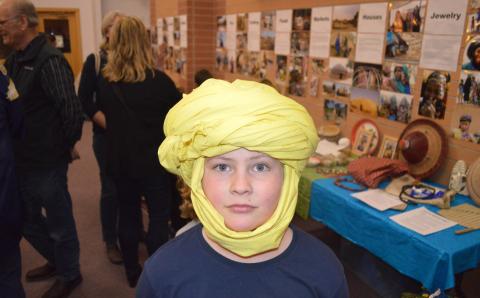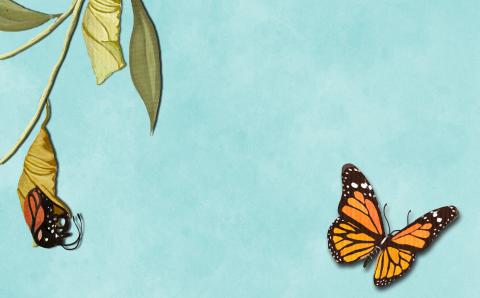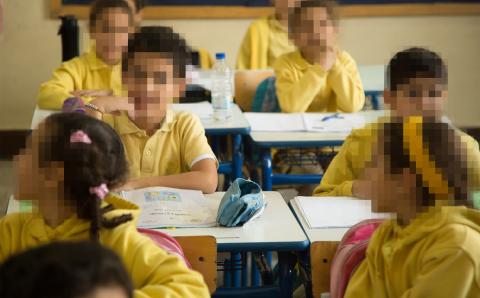I was at an open house for my daughter’s high school when I met Mustafa and his daughter, Deya. Deya, the same age as my daughter, wore a soft blue hijab which set off her brown eyes. To be honest, I was a little surprised to see this father and daughter at an open house for a Christian high school. I tried and failed to imagine myself and my daughter at an open house for a Muslim high school. I couldn’t wrap my mind around it. Nonetheless, here was a fellow human being, an image-bearer of our Creator. This father and daughter were new, and at least looked out of place. Did they also feel out of place? As a longtime member of this school community, I wanted to be welcoming.
“Hello! I’m Lorilee!” I said, extending my hand to the father over the round table. The man smiled broadly and shook my hand enthusiastically. “I am Mustafa, and this is my daughter, Deya.”
My husband also introduced himself, and we chatted about Deya being in some of the same classes as our daughter, Phoebe. In fact, because classes had already begun for the year, Deya already knew Phoebe and sat with her in history class. We started to run out of things to say, but I had one more item in my conversational toolbox.
“I am reading a book right now, and one of the characters is named Mustafa,” I said. “Such a beautiful name. I won’t forget your name now.” Mustafa was a gregarious guy—I already knew that. But his eyes lit up beyond friendliness.
I read a study once of the power of remembering names. People feel honored, seen, and even complimented when you remember. A related study revealed that when you pay someone any kind of sincere compliment, the air changes around you. Both you and the person to whom you have paid the compliment now have 30% more energy.
“Really?” He said, leaning forward. “What is the book?”
“The Beekeeper of Aleppo,” I said. “It’s about a man from Syria who has to flee his country and become a refugee.”
At that point, the teacher began his presentation. Mustafa smiled warmly at me and nodded. It would be an overstatement to say we were friends after that, but the air had changed between us. There was an authentic connection established, companionable energy. And it all started with what I was reading.
“Reading brings us unknown friends,” said Honoré de Balzac. You might take that to mean that we as readers become friends with the characters in the books we read. But I believe that through reading, we can understand one another in a new way and build bridges where there were once just impassable gulches of misunderstanding—and maybe even fear.
***
I ordered The Beekeeper of Aleppo because I was interested in learning more about the experience of refugees from the Middle East, and also because I have a soft spot for beekeeping. My Mennonite Opa had kept bees in Ukraine before Stalin’s Bolsheviks drove out my family during World War II. The book’s cover was superb, and the reviews were all raving.
I knew going in that this was not my kind of book. My kind of book, if I am being honest, is lighter, funnier, and more hopeful. A book such as Eleanor Oliphant Is Completely Fine suits me perfectly: On the surface, it seems easy, breezy, and even hilarious at times, yet is studded with gems of insight into our shared human condition. It is a velvet brick of one woman’s mental distress wrapped in zingy dialogue and cheeky humor. Give me hidden depths every time. I can cope with the profundities and pits much better if they are revealed in a world where flippancies and frivolities also exist. If I am laughing as well as crying, I am happy.
Without spoiling The Beekeeper of Aleppo, there is no cheeky humor. I did not laugh, not even once. “Nuri is a beekeeper and Afra, his wife, is an artist,” the editorial copy describes the book. Each morning, “Nuri rises early to hear the call to prayer before driving to his hives in the countryside. On weekends, Afra sells her colorful landscape paintings at the open-air market. They live a simple life, rich in family and friends, in the hills of the beautiful Syrian city of Aleppo—until the unthinkable happens. … (A)ll they love is destroyed by war.”
The only lifeline Nuri and Afra (and the reader) have is the hope that Nuri’s cousin Mustafa is waiting for them in England, where he has started an apiary and is teaching other refugees beekeeping. We as readers get to know Mustafa in flashbacks to the golden days when he and Nuri kept bees and honey flowed like water. Mustafa is a ray of light in a novel where the characters are faced with unspeakable torment and loss. I often found the suffering to be overwhelming, yet I continued to turn the pages, listening to and learning from the characters.
In the end, The Beekeeper of Aleppo was worthwhile. Its bleak narrative represented the hopeless circumstances of millions of refugees around the world. It brought faraway lands like Syria close to home. I didn’t know Aleppo had been sunny and beautiful and art-filled; to me, from what I had seen on the news, it was a gray pile of rubble and despair. The book put human faces on the Syrian war and the ongoing struggles of Syrian citizens. These people were not just cold statistics to me anymore—they were Nuri, Afra, and, of course, Mustafa.
Especially Mustafa.
Because of him, the real Mustafa was made more real to me even before we met. I knew something of his religion and region of the world. I also knew—phew!—that he was not named for Mufasa, the king of the Pride Lands and the father of Simba in Disney’s The Lion King. Yes, I probably would have blurted out something Lion King-related had I not read The Beekeeper of Aleppo. (I’m blushing at the thought.)
Because of my reading, I was able to receive Mustafa as a human, to see him. Reading helps us see others—maybe for the first time. Books and stories can plant seeds of empathy, and to empathize with another is the beginning of peace.
Empathy moves you from “my here” to “their there,” says Belinda Bauman in her book Brave Souls: Experiencing the Audacious Power of Empathy. We often try to live with others “on our terms, with our assumptions from our perspectives.”
Reading about people very different from ourselves transports us, moving us away from our terms, assumptions, and limited worldviews. Books offer us a world where we can willingly enter in another’s suffering and maybe even do something about it back in the “real world” when we finish a book.
“When we show people we understand their context, that we ‘get’ them,” Bauman writes, “we demonstrate empathy and empower change.” And we are given new tools to stand with those whom God loves.
I think of the uptick in the last few years in anti-Semitic crimes, and how a book I thoroughly enjoyed made me feel differently about anti-Semitism.
I knew the statistics. In New York alone, hate crimes against Jews jumped 21% in 2019, according to The Washington Post. From the same article, I learned “there were 1,879 incidents of anti-Semitism in the United States in 2018, including more than 1,000 instances of harassment.” Terrible, I would always think when I read such numbers. Just despicable. But it wasn’t until I entered the world of a book heroine that the needle moved as far as my emotional engagement on the subject.
The heroine is Natalie Marx, and the book is The Inn at Lake Devine by Elinor Lipman. Published in 1999 and set in the early 1960s, I found it at a garage sale in recent years and parked it on my sagging “unread” shelf. The cover beguiled me with its blue lakefront bordered by red Adirondack chairs (or as we say in my Canadian homeland, Muskoka chairs). A summer book, I thought. Something to read at the lake. So last summer—on a trip to Muskoka, ironically—I grabbed it and threw it into my heaving book tote.
Natalie is 12 when the book opens, and she’s just heard that the summer resort in Vermont where her family had inquired about spending their next vacation has rebuffed them. “The Inn at Lake Devine is a family-owned resort, which has been in continuous operation since 1922,” the owner had written to Natalie’s mother. “Our guests who feel most comfortable here, and return year after year, are Gentiles.” Sweet-tart Natalie, whom I imagined as a young Nora Ephron, is infuriated—as was I. The passive-aggressive politeness with which the message was delivered seemed almost worse to me, a whitewashed sepulcher.
For the rest of the book, Lipman follows a growing Natalie’s obsession with this resort, a small citadel of discreet anti-Semitism. As she tries to enter the world that has excluded her, we as readers feel excluded too. I so invested in Natalie’s story that when vandals in my own city defaced a local synagogue, I was outraged on a new level. Reading Lipman’s book moved me out of my limited worldview as a white Protestant. I was able to take on the perspective of another—Natalie—and by extension her Jewish sisters and brothers. This anti-Semitic act felt personal to me, and not just because I had accompanied my son to that synagogue for a field trip many years before. In a Facebook post, I denounced the act, saying how sad it made me, and declared that I was standing with the Jews in my city and elsewhere.
Obviously, a Facebook post is minor. I won’t win the Nobel Peace Prize. But maybe in a small way I was working toward harmony in divisive times. And because our faith is big on harmony—real concord, not false peace—maybe I was onto something important.
Both the Old Testament and the New Testament speak of the importance of seeking peace. “Peace, peace to those far and near,” Isaiah says (Isa. 57:19). In the gospels, Jesus often uses the greeting “Peace be with you” (e.g., John 20:26).
It’s noteworthy that biblical peace is much more than the absence of conflict. Biblically, shalom is seen in reference to the well-being of others.
In the book Not the Way It’s Supposed to Be: A Breviary of Sin, author Cornelius Plantinga describes the Old Testament concept of shalom: “Shalom means universal flourishing, wholeness, and delight—a rich state of affairs in which natural needs are satisfied and natural gifts fruitfully employed, a state of affairs that inspires joyful wonder as its Creator and Savior opens doors and welcomes the creatures in whom he delights.”
There are many ways to work for shalom in our world, but I submit that reading could be a start to that work. When we challenge ourselves to read in a way that wakes us up to see the world and its creatures in a different way, we grow in empathy and understanding. We can contribute better to creating, along with our Creator, more flourishing, wholeness, and delight for our fellow image-bearers.
“If you are always with people that think like you, how are you going to grow?” Pioneering Latina author Sandra Cisneros (the author of my current read, The House on Mango Street) posed this question to an audience gathered for a writers’ conference. Another way to say it: “If you are always reading about people that think like you, how are you going to grow?”
This doesn’t mean every book you read has to be hugely growth-spurring or devoid of the things that delight you. (Though how wonderful it is to find a book such as The Inn at Lake Devine, which offered me a view into the Jewish experience and made me laugh and turn the pages faster and faster. The saying “You catch more flies with honey than with vinegar” is so true.)
I still relish my “gelato for the soul” reads, which are usually set in the United Kingdom and involve quirky U.K. people doing adorably U.K. things, often in bookstores and always with tankards of tea.
However, in the interest of growth and maybe even peacemaking, I choose to read at least one diverse read per month, usually more. This has opened my mind—my stubbornly white, Mennonite, Christian Reformed mind—to other worlds, cultures, and perspectives. It has brought me untold friends, both fictional and flesh-and-blood.
In writing and reading, “you don’t know it, but you’re doing an act of peace in violent times,” Cisneros said. “You are ambassadors for communication and understanding of people unlike yourselves.”
If you think about it that way, peace could be only a few pages away. A book could be one small cure for what ails us. It’s a wounded world out there; let’s start to heal it through reading, one book at a time.
Discussion Questions
- When you think of the word, “peacemaking,” what comes to mind?
- “Reading brings us unknown friends.” Has that been true of your own reading experiences? Why or why not?
- Do you agree that “to empathize with another is the beginning of peace”? How have you witnessed that to be true or not to be true?
- What have you read that has opened you to empathize with cultures you otherwise may not know?
About the Author
Lorilee Craker, a native of Winnipeg, Man., lives in Grand Rapids, Mich. The author of 16 books, she is the Mixed Media editor of The Banner. Her latest book is called Eat Like a Heroine: Nourish and Flourish With Bookish Stars From Anne of Green Gables to Zora Neale Hurston.








